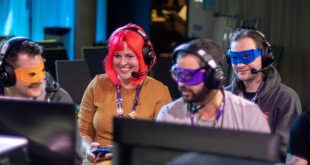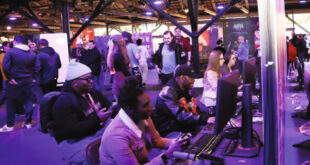 Amiqus’ Business Manager Liz Prince speaks to Dom Shaw, EDI coordinator at Ukie who also leads #RaiseTheGame, about the recent Access November initiative …
Amiqus’ Business Manager Liz Prince speaks to Dom Shaw, EDI coordinator at Ukie who also leads #RaiseTheGame, about the recent Access November initiative …
WHAT WAS THE THINKING BEHIND THE #RAISETHEGAME ACCESS NOVEMBER INITIATIVE?
As someone who is neurodiverse myself, I’ve always wanted people to have more awareness of what neurodiversity is, and to see greater representation with characters in games proudly seen as autistic or with ADHD, playing leading roles in stories, positively portrayed and, overall, more visibility of such characters to potentially be role models to young audiences or someone’s new favourite.
Yet you need a little more than your own perspective to really begin a campaign, so I started to talk to a mixture of friends and industry acquaintances who are disabled and/or neurodiverse to get their views. Then I reached out to industry experts on accessibility and charities involved in games to get their thoughts. What I began to see was everyone had the same opinions of wanting more awareness driven on an industry scale, needing more support in place, and for disabled and neurodiverse individuals or communities (whether players or working in industry) to feel empowered and have a sense of greater belonging to an industry that many have made their home.
TALK US THROUGH THE VARIOUS ELEMENTS AND EVENTS OF THE INITIATIVE.
The campaign took place mainly online to ensure we could reach as much of the games industry as possible through articles and workshop webinars with the likes of Sarah Brewster, Alice Cooper, Cari Watterton, Sightless Kombat and Chris Goodyear discussing best practices around accessibility and support for disabled and neurodiverse folks in workplaces. We also had a few in-person opportunities like Accessible Gaming Night at the charity Everyone Can centre in Manchester to emphasise the importance of hybrid and outreach – because the more choices and options we provide people to get involved the more engagement you are likely to see.
In the first week of the campaign, we partnered with AbilityNet to facilitate talks and content around video games and interactive entertainment for the annual conference this year – TechShare Pro 2022 – where we saw the likes of Sony Interactive Entertainment, RNIB, Ubisoft, Soft Leaf Studios and Activision Blizzard King talk about accessibility. We also worked with one of our supporters, mayamada, to facilitate an accessibility panel as part of their Gamepad Online event series for November.
IS THE UK GAMES INDUSTRY DOING ENOUGH TO SUPPORT THOSE WITH DISABILITIES AND NEURODIVERSITY?
No. That’s not to say the efforts are not there and the work isn’t
developing. Throughout Access November we’ve spotlighted game companies putting in the effort to make their games more inclusively designed and accessible. We worked with some amazing partners (and individuals) like Many Cats Studios, RNIB, Game Accessibility Nexus, Autistica and the folks behind GAconf, to name but a few, who are leading the charge to support disabled and neurodiverse players get their hands on games, and new talent get careers in games.
What’s lovely for me to see as well is professionals already in industry who are opening up and laying their cards on the table and being proud of their ID while getting the support they need. As little as five years ago I could only name you one or two other professionals who would be open about their own lived experiences around disability and/or neurodiversity. Now I could give you a list in the hundreds, which is incredible, and means something has changed in our industry for people to be more open and honest.
WHAT HAVE BEEN THE BARRIERS TO DATE ON THEM BEING MORE SUPPORTIVE?
I think a big barrier is a lack of understanding and misinformation. People have so many assumptions and stigmas against people with disabilities and/or neurodiversity conditions when in reality most people don’t know anyone or haven’t spoken to anyone with that lived experience to get a clearer full picture. This is why education using reliable stats and authentic representation is vital to increase visibility and strengthen awareness; not to mention increase overall inclusion and intersectionality.
Deeper down that rabbit hole, many industry professionals, before lockdown, weren’t exposed to the challenges disabled and neurodiverse individuals face daily, especially around employment and mental health when there are no robust support systems or reasonable adjustments in place. With most neurodevelopmental conditions being invisible, disabilities and more visible disabilities suffering a lack of insight from the general population, you can see why there is a lack of awareness.
WHAT’S NEXT FROM #RAISETHEGAME?
Hopefully by the time this article is published we’ll have announced our next project to support disabled and neurodiverse individuals and communities even further. On top of this we are continuing to signpost best practices, introduce organisations to games companies that can assist around the progress they need for change, and develop more resources needed to strengthen the growth and momentum around equality, diversity and inclusion. But most of all #RaiseTheGame is making sure that with every step we make forward we prioritise transparency, opportunities to come together as a community and the intersectionality across all forms of diversity and inclusion – because these are the elements that started the initiative and are needed for this industry to truly be accessible and inclusive!

 MCV/DEVELOP News, events, research and jobs from the games industry
MCV/DEVELOP News, events, research and jobs from the games industry




